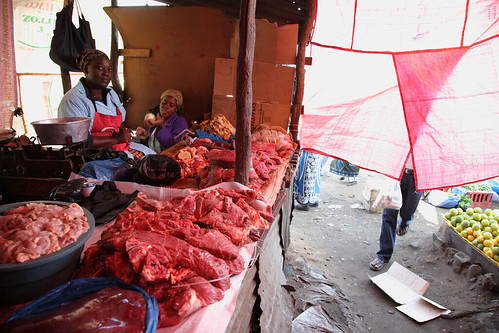Posted by Tezira Lore under A4NH, Africa, Agri-Health, CRP4, Events,Food Safety, Food Safety Zoonoses, Health, ILRI | Tags: AASW6, FARA |
Leave a Comment
Traders in beef and pork meat at the Xipamanine traditional market in Maputo, Mozambique (photo credit: ILRI/Stevie Mann).
In many countries of sub-Saharan Africa, informal markets play an important role in supplying most of the meat, milk, eggs and fish that poor people depend on for their nourishment.
Informal markets are those where traditional processing and products predominate and where traders are often unlicensed and do not pay tax.
Examples include street food markets, milk hawking systems, wet markets for pork, backyard poultry systems and artisanal production of cheese and other fermented milk products.
Despite the important role of Africa’s informal food markets in providing nutrition, employment and income to millions of people, these markets are often not subject to effective health and safety regulation.
Several approaches to food safety in informal markets have focused on food-borne hazards, with a tendency to adopt stringent international food quality standards with little regard for local contexts.
On the other hand, risk-based approaches to food safety do not just consider the presence or absence of food-borne hazards, but go further to assess whether there are certain practices that can minimize the health risks presented by the hazards.
Take, for example, the case of raw milk which is often sold informally in many parts of sub-Saharan Africa.
It is well known that raw milk is a good medium for microbial growth and is prone to microbial spoilage if not cooled immediately after milking.
Pathogenic species like E. coli often occur naturally in raw milk. However, most consumers in Africa routinely boil milk before they drink it, a simple practice that effectively kills any milk-borne pathogens, thus rendering the milk safe to drink.
A hazard-based approach to food safety that focuses solely on the hazard (E. coli in raw milk) would quickly condemn the milk as ‘unsafe for human consumption’.
However, a risk-based approach that considers risk assessment (E. coli is present in raw milk and causes disease), risk management (boiling of raw milk) and risk communication (educating consumers to boil milk before drinking it) is more appropriate as it is based on evidence of potential harm and not perceptions.
The subject of food safety in informal markets in Africa will be among several topics to be discussed during a side event by the International Livestock Research Institute (ILRI) on the first day of the 6th Africa Agriculture Science Week which takes place on 15-20 July 2013 in Accra, Ghana.
The topic of the ILRI side event is Livestock research for Africa’s food security.